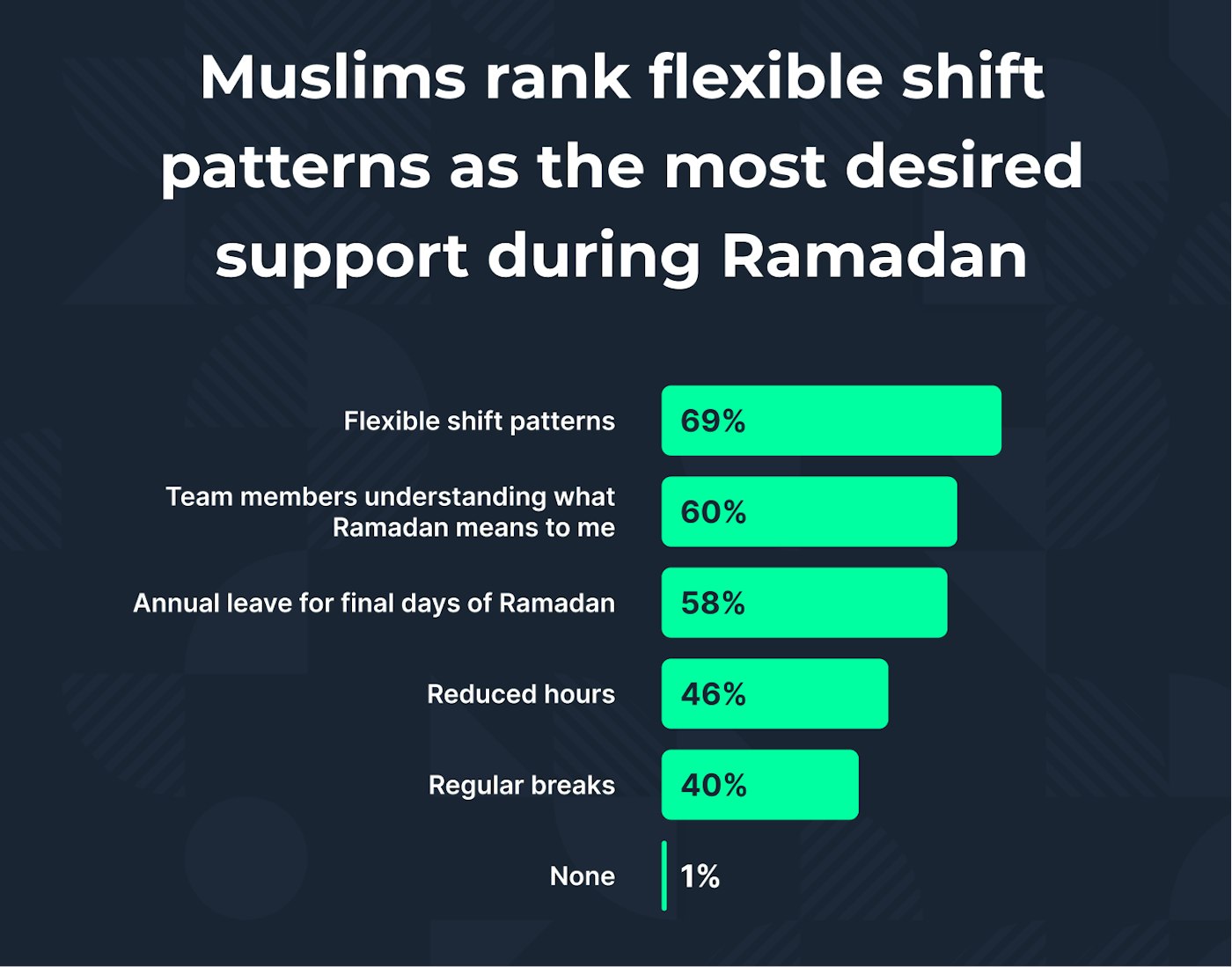
Ramadan is fast approaching. We know that managing work and fasting can sometimes be challenging and that an accommodating work environment can make all the difference! We have written this guide for you to send to your employers (or to implement yourself if you are one), to educate about Ramadan and help create an inclusive and accommodating environment at work.
101 on Ramadan
The holy month of Ramadan is when Muslims are prescribed to fast from dawn until dusk for 30 days, if their health allows them to. It is also one of the holiest times of year, where Muslims are encouraged to increase their prayers, engage in various forms of worship, perform good deeds, give charity generously and generally become more devout to their faith during this sacred month.
Of the 3.8 million Muslims in the UK, over 48% are estimated to be in the workforce. Consequently, a significant portion of Muslim colleagues will be observing this month whilst working, which can often be challenging. With the rise of the equity, diversity and inclusion agenda, it is imperative for employers to accommodate their needs. Accommodating for Muslim employees in Ramadan is about helping to create a safe environment, especially within a backdrop of increased Islamophobia. Being able to create a safe and inclusive environment helps employees reach their potential within a professional space.
According to a recent survey by Muslim Census, 99% of respondents had specific requests for support during Ramadan in the workplace. The top three needs were flexible working hours (65%), understanding from team members about Ramadan (60%), and annual leave for the final days of Ramadan (58%). This survey also showed Muslims are twice as likely to stick to employers who are supportive during Ramadan.

Support requests during Ramadan from Muslim employees – Muslim Census
Below is a Ramadan guide for employers to support their Muslim employees, fostering an inclusive workplace that supports their wellbeing and allows them to bring their whole self to work in a meaningful way.
Educate the company
While Ramadan may be a well known concept to most people, many do not understand the details of it or why Muslims observe it. In addition, there are nuances that line managers and teams need to be mindful of to understand the impact on their Muslim colleagues and be prepared to accommodate their needs with empathy and in a respectful manner. This includes nuances such as not all Muslims will be fasting, this may be because it is not something they practise or, they may be exempt for health reasons or that women do not need to fast on their menses and so they may only be fasting part of the month. It may also be a month where people who do not usually practise their faith openly across the year may become more practising and observe the month in its entirety; all of which should not be questioned by others.
Emphasising the spiritual significance of the month and providing general education about Ramadan will also help Muslim colleagues feel valued and respected in the workplace. This will also enable line managers to feel more confident in supporting team members who are observing Ramadan, contributing to rich and healthy diversity and inclusion practises.
Consider having someone external to the team, like Amaliah or Diversity Diagnostics to deliver a presentation. If you have a faith or people of colour staff network or an equity, diversity and inclusion team in the workplace, you could also invite them to deliver a presentation during an all staff briefing. Additionally, publish details on the staff intranet and communicate them through internal communication channels. You can also reference this guide as part of the guidance issued to managers, referencing relevant work policies such as flexible working or equality, diversity and inclusion policies as needed. The main point here is to educate the entire company with an understanding of Ramadan and how they can support their colleagues.
Offer flexible working arrangements
In a post-COVID world, many employers have embraced flexible working to some extent. However, hybrid work setups often involve a blend of office and remote days, and certain roles may still require full in-person attendance.
During Ramadan, Muslims wake up early for the pre-dawn meal (suhoor), typically around 03:00 – 04:00 am in the UK and break their fast between 5:30 – 7:30pm, leaving little time for commuting and preparing food to break their fast (iftar). As energy levels can dip later in the day and many wish to focus on worship as the fast ends, flexible working arrangements that suit individual needs become crucial.
To support Muslim employees, consider offering the option to work from home throughout Ramadan, with the expectation to come into the office only when absolutely necessary. When in person presence is required, expecting them to be in or setting meetings neither too early nor too late, accommodates their altered schedule. For remote work, some employees also find it preferable to complete quiet work during the late hours of the night when they can consume food and drink.
Flexibility in meeting times, respecting individual preferences for working patterns and allowing for quiet work during late-night hours can further support colleagues during this period. This approach ensures that both the company and the employees can be the most effective and productive, leading to mutual benefits.
“My manager allowed me to work from home despite usually having to come into the office one day a week. Super helpful to have time to prepare iftar etc. I was also checked in on often, and it was understood that my capacity may be at a lower level than usual due to being less focused in those first few adjustment days!” – Layla, working in Policy and Campaigns
Create an inclusive environment in the office and online
In addition to the above, there are other ways to create an inclusive environment for Muslim employees during Ramadan.
If going into work in person is required, it’s important to set up a designated prayer area available during work hours. This space should be quiet and spacious enough to allow prostration, with small items like a prayer mat provided. Not all Muslims pray regularly and some may only begin in Ramadan, so setting up this area in advance ensures that those who choose to start feel comfortable. Longer term, this should be a permanent part of the office set up and communicated to all staff as part of their induction. This space can also serve as a quiet space for all colleagues when needed.
“Alhamdulilah, work has allowed me with flexible working hours as well as always provided a space for prayer as well!” – Samira, working as a Fundraiser.
For colleagues who may need to stay late and break their fast in the office, it is recommended to provide refreshments such as water, juice, dates and fruits. In some offices, a light spread is provided for those who need to stay back, especially if the canteen is closed and there are no alternative outlets nearby.
When working remotely, it is important to accommodate prayer times which most people will take in multiple breaks in lieu of their lunch break. As prayers are at prescribed times, it may be necessary to adjust schedules, specially on days with heavy meetings. Encourage colleagues to block out prayer breaks in their diaries for ease of scheduling.
“In addition to the usual flexible working hours, my last few teams accommodated me by scheduling (where possible) most meetings in the morning when I had the most energy which helped!” – Sabrine, working in Project Management.
It is also advised to be mindful of their wellbeing and stress levels and ensure you check in with your line reports and team members as needed, either in their regular one-to-ones or at intervals throughout the month.
Accommodate leave for Muslim colleagues
The last ten days and nights of Ramadan are amongst the holiest of the year. Many Muslims fast all day and pray all night, in search of what is called ‘Laylatul Qadr’ – a night better than a thousand months. This means many Muslim colleagues will be exerting themselves mentally, spiritually and physically.
Some may request this time off in addition to the religious holiday Eid and much like Christmas time for those celebrating or school holidays for parents and families, it is important that Muslim colleagues are given first priority for leave during this time.
101 on Eid
Eid marks the end of Ramadan’s fasting period and is a time of joy, gratitude, and community gatherings. Muslim employees will require time off to observe Eid, typically one or two days depending on cultural and religious practices.
It’s important to note that the date of Eid al-Fitr varies each year as it follows the Islamic lunar calendar and is dependent on the sighting of the moon; meaning it is only confirmed the evening before after the sun sets. In addition, different Muslim communities may celebrate Eid al-Fitr on varying days due to diverse moon sighting practices and interpretations of Islamic law. This means that Muslim employees may request time off based on their community’s observance, which may differ from the officially declared date. As a result, Muslim employees may not have fixed leave dates in advance.
Employers can show support by offering flexibility in scheduling time off once Eid’s date is confirmed. If they are only choosing to take one day, this could be done by allowing them to block out two days in their leave calendar and cancelling one accordingly.
Moreover, extending appropriate Eid greetings such as “Eid Mubarak” (Blessed Eid) and “Eid Sa’id” (Happy Eid) to Muslim colleagues not only acknowledges the significance of this religious observance, but also conveys goodwill and fosters inclusivity in the workplace.
In cases where people’s leave might be limited, where possible, you could also accommodate days off in lieu of statutory holidays or other company designated days off.
“If colleagues want to work during a Bank Holiday (like Good Friday or Easter Monday), they can, thus freeing up time to take a holiday for a religious observation, such as Eid.” – Judith, A non-Muslim Director who accommodates her staff from within the leadership team.
If you follow the tips above, you will be well on your way to creating an inclusive, productive and accommodating environment for Muslim colleagues, whether they are fasting during Ramadan or otherwise.
The key is to understand that different colleagues may have different needs that help them be the best version of themselves in the working world! Implementing policies and arrangements like these can go a long way in retaining Muslim colleagues in your workforce and will be greatly appreciated by them. This will also demonstrate your commitment to diversity, inclusion, and understanding of the needs of all employees.
Amaliah Team
This article was written by a member of the Amaliah team or a collective team effort. You can follow us on @amaliah_tweets for the latest or head over to our Instagram @amaliah_com. If you're reading this and are thinking about contributing an article then send us an email with a brief or a full article to contribute@amaliah.com